
According to the Centers for Disease Control (CDC), human papillomavirus (HPV) is the most frequent sexually transmitted disease in the United States (STD). Although there is no cure for the virus, there are various measures to avoid infection.
What Exactly is HPV?
Sexually active men and women are at risk of contracting HPV, which spreads through vaginal, anal, and oral intercourse, as well as intimate contact. Many infected persons show no symptoms, and the virus may disappear on its own. Some people, however, never recover from the virus.
There are many different forms of HPV, and some of them cause genital warts. Some strains enhance the chance of cervix, penis, vulva, anus, and throat cancers.
How to Avoid HPV
Abstinence, like other STDs, is the only sure strategy to avoid transmitting or spreading HPV.
Abstinence
Because it is communicated during sexual activity, avoiding intercourse and intimate contact would prevent HPV infection and transmission.
Monogamy
Another strategy to avoid HPV is to practice monogamy, which means having only one uninfected partner who is also monogamous. However, it is crucial to realize that many people with HPV have no symptoms and that there is no “STD test” that can detect a person’s status.
Vaccination
HPV vaccines are effective in preventing genital warts as well as 90% of HPV-related malignancies. Children should receive the HPV vaccine before becoming sexually active, which is normally between the ages of 11 and 12; unvaccinated persons up to the age of 26 should also be vaccinated. Furthermore, infants as young as 9 and adults as old as 45 may be eligible for the immunization.
Do Condoms Protect Against HPV?
In a nutshell, sure, however they aren’t ideal. Condoms are at least partly effective in preventing STDs, including HPV and HPV-related warts and cancer, and the CDC recommends them for all sexually active persons. Yet, variables such as incomplete coverage and user error can reduce a condom’s protective quality, as well as the risk of pregnancy. Using condoms (and dental dams) with vaccination and informed sexual encounters reduces the risk of developing HPV or passing it to a partner substantially.
Its much better to get tested at novelty clinic before it gets late.
